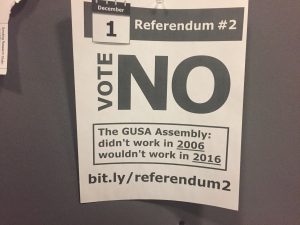After an hour and a half of debate, the GUSA Senate voted on Sunday afternoon to decertify the results of the 2023 executive election against the recommendation of the Election Commission. There will be a new election from Oct. 19 to Oct. 20, according to current president Camber Vincent (SFS ’24).
“It will be an exact rerun of the previous election,” John DiPierri (SFS ’25), the chair of the Ethics and Oversight committee, said in an interview with the Voice following the meeting. “It will be the same process, with town halls and campaigning and everything.”
According to the Election Commission, Jaden Cobb (CAS ’25) and Sanaa Mehta (SFS ’25) won with 53.6 percent of the vote and 827 votes, beating the ticket of Saatvik Sunkavalli (SFS ’25) and Andrea Li (SFS ’26) with 389 votes and the ticket of Axel Abrica (CAS ’25) and Sebastian Cardena (CAS ’26) with 293 votes. Those results will be thrown out and a special election will take place in the next few weeks, according to an update on the Election Commission’s Twitter.
The commission began the meeting with a presentation of the vote totals, as well as the campaign violations they had investigated and sanctioned. According to the presentation, the commission had received reports from opposing tickets that the Cobb/Mehta campaign had set up a station with electronics during the voting period, that the campaign had received an endorsement from an official GUSA Inclusion and Equity Instagram, and that the campaign had engaged in “harassment, bullying, and hostility.”
Related to the campaign station with electronics, Election Commissioner Pratik Jacob (CAS ’25) said that he approached the station on Friday afternoon and told them they should put away the electronics, because the commission could not be certain they were not being used to help students vote.
The commission presented photos and a video taken later that day showing electronics still on the Cobb/Mehta table. Although they could not determine if the electronics had been used to solicit votes, they determined with the video evidence—wherein Cobb asks a student if they had voted—that the campaign’s actions violated GUSA bylaw 16.04, which prohibits campaign-run voting stations with electronic devices.
The commission met for an emergency meeting on the night of Oct. 6 to determine the extent of any sanctions, and decided that the Cobb/Mehta ticket was suspended from conducting campaign activities for the remainder of Election Day.
In regards to the endorsement from the official GUSA Inclusion and Equity Instagram, the Election Commission could not determine if a member of the Cobb/Mehta campaign had posted the endorsement themselves, and because the bylaws do not mention endorsements from GUSA-affiliated organizations, they decided not to sanction the pair.
The bullying allegations were directed to the Office of Student Conduct, the commission said, because they were serious allegations and the commission did not feel it had the authority to direct or act on any investigation.
Vincent added during the meeting that allegations of student conduct violations, distinct from campaign violations, are out of the hands of GUSA.
“Until the university has told us this was a student conduct violation, there is nothing we can do,” Vincent said.
The Senate deliberated on whether or not the campaign table violation constituted a “serious procedural or technical error” in the election process, as the GUSA bylaws state those are the only reasons the Senate should fail to certify the election results. The Election Commission clarified that during the period in which the Cobb/Mehta campaign’s table was violating the bylaws, they believed the number of votes they received was not enough to affect the outcome of the election, which was decided by a wide margin.
Some senators argued that the “serious” wording of the bylaw suggested that the violations would need to have decided the outcome of the election for decertification to be justified. However, others, including Sunkavalli and Abrica, said that because the Election Commission had been opaque and at times inconsistent in its guidance with other tickets, there were grounds to decertify.
After extensive discussion, the Senate moved to vote; certification required a two-thirds majority to pass. The Senate failed to certify by a vote of 11 in favor, six against, with three abstaining and two not present.
After rejecting the Election Commission’s recommendation, the Senate then moved for a formal decertification vote. The Senate then pushed the rest of its business until the next meeting and adjourned.
“I am disappointed that the Senate voted to decertify the election on the grounds that there was a serious procedural or technical error in the proceedings of the vote,” Vincent wrote to the Voice following the meeting. “From what was presented in the meeting, it was my understanding that the EC had acted according to the By-Laws.”
DiPierri said that the election would be completely redone, calling the situation “very unprecedented.”
He said that the Election Commission would have to decide whether the Cobb/Mehta ticket would be eligible.
DiPierri moved early in the meeting to split the vote on the Executive and Senate elections and debate it separately. The Senate elections, both class of 2027 and at-large, were certified without incident.
“I hope for patience for the president, Senate, and the Election Commission as we navigate this,” DiPierri said.
This is a developing story, and will be updated as more information is available.




